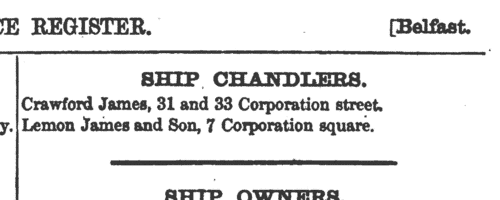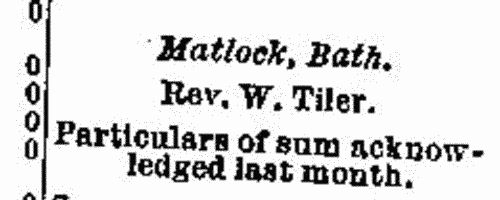Add this eBook to your basket to receive access to all 99 records. Our indexes include entries for the spelling mumby. In the period you have requested, we have the following 99 records (displaying 41 to 50): These sample scans are from the original record. You will get scans of the full pages or articles where the surname you searched for has been found. Your web browser may prevent the sample windows from opening; in this case please change your browser settings to allow pop-up windows from this site. Unclaimed Dividends
(1855)
The unclaimed dividend books of the Bank of England, containing names and descriptions of over 20,000 persons entitled to many millions of pounds accumulated in the bank unclaimed during the 18th and 19th centuries, mostly in consols and annuities, and transferred to the Commissioners for the Reduction of the National Debt.
| Sample scan, click to enlarge

| Contributors to the Phonetic Fund
(1856)
The Phonetic Journal, published weekly, contains English texts rendered phonetically, and news about the promotion of phonetic reform and phonography. The section entitled Intelligence included lists of new members of the Phonetic Society, alterations (such as changes of address), and lists of contributions to the Phonetic Fund. The lists of new members give full name (surname first) and address, preceded by a number indicating the class or grade achieved in their phonetic studies. In the tables of contributions, full names and addresses are only given for the major donors; the mass of small contributors are listed by surname and initials. | Sample scan, click to enlarge

| Gentry in London
(1856)
The Post Office London Directory for 1856 includes this 'Court Directory', listing alphabetically by surname and christian name the upper class residents of the capital with their postal addresses. 'In order to afford space for the addresses, the abbreviation "esq." for esquire has no longer been appended to each name in the Court Directory. It should be understood that such should be added to the name of every gentleman in the following pages to which no inconsistent addition is affixed.' Decorations, honours &c. are generally given. Some gentlemen appear who are also listed (as professional men, &c.) in the commercial section. Those with second residences in the provinces usually have the country address given as well. | Sample scan, click to enlarge

| Pharmaceutical Society of Great Britain: Country Members
(1856)
The membership list of the Pharmaceutical Society was divided into London Members; Country Members; Foreign Life Members; Associates admitted before 1 July 1842; Associates who have passed the Major Examination; and Associates who have passed the Minor Examination. In each case the lists give year of admission; number of certificate (where appropriate); name (surname first, christian name and initials); and address (house number and street name in London, merely town of residence elsewhere). An asterisk before the surname indicates a life member (except in the list of Foreign Life Members). There is also a list of registered apprentices: in this list we have year of registration, full name (surname first); master's name (in the form 'residing with Mr. Smith') and town. | Sample scan, click to enlarge

| Schoolmasters and trainees with Certificates of Merit
(1856)
The Committee of Council on Education for England and Wales produced an annual report which included several lists of teachers and trainee teachers, including an Annual Calendar of Teachers who have Obtained Certificates of Merit (completed to 1 January 1856), from which this sample scan is taken. The teachers are listed alphabetically by surname and initial, with name of school, post town or county, and grade, as either certificate or class. Student teachers were classed at the end of each year of training, so the column for class shows a student's class (1, 2 or 3) at the end of their first or second year of training. The teacher may then be awarded a certificate of merit by Her Majesty's Inspector, in which case the class and division of the certificate awarded appears in the columns for Certificate. No certificate of merit was granted a student, as a teacher, until he or she had been for two years in charge of the same elementary school, and the certificate was granted on the basis of two reports of performance as a teacher in school. If the first report was favourable, the teacher was paid for the first year on the scale of the lowest class; if the second report was favourable, augmentation and class of certificate was fixed for the next five years, after which (and so on from time to time) the certificates were open to revision. The value of the certificate, in the first instance, was not fixed higher than the first division of the third class, for any student who had resided less than two years at a training school under inspection. This is the index to the schoolmasters and male students in training schools. | Sample scan, click to enlarge

| Traders and professionals in London
(1856)
The Post Office London Directory for 1856 includes this 'Commercial and Professional Directory', recording over 100,000 individuals. | Sample scan, click to enlarge

| Patentees of New Inventions
(1857)
Abstracts of British patents for new inventions applied for and granted from 1 January to 31 December 1857: giving date, name and address, and short description of the invention. It is then stated whether 'Letters patent sealed' or 'Provisional protection only'. | Sample scan, click to enlarge

| Long-stay Paupers in Workhouses: Sculcoates
(1861)
This comprehensive return by the Poor Law Board for England and Wales in July 1861 revealed that of the 67,800 paupers aged 16 or over, exclusive of vagrants, then in the Board's workhouses, 14,216 (6,569 men, 7,647 women) had been inmates for a continuous period of five years and upwards. The return lists all these long-stay inmates from each of the 626 workhouses that had been existence for five years and more, giving full name; the amount of time that each had been in the workhouse (years and months); the reason assigned why the pauper in each case was unable to sustain himself or herself; and whether or not the pauper had been brought up in a district or workhouse school (very few had). The commonest reasons given for this long stay in the workhouse were: old age and infirm (3,331); infirm (2,565); idiot (1,565); weak mind (1,026); imbecile (997); and illness (493). | Sample scan, click to enlarge

| Grimsby Smack and Ship Owners
(1863)
Straker's Annual Mercantile, Ship and Insurance Register includes lists of ship owners in Belfast, Cardiff, Colchester, Dover, Dublin, Falmouth, Folkestone, Grimsby, Hartlepool, Harwich, Hull, Leith, London, Lynn, Newcastle, Penzance, Plymouth, Ramsgate & Margate, South Shields, Sunderland, Swansea, Wisbech and Yarmouth. In each case the list gives surname, christian name or initials, and (usually) address. | Sample scan, click to enlarge

| Missionaries and contributors
(1864)
The Evangelical Magazine and Missionary Chronicle records the work of Christian missionaries throughout the world, and of the supporting missionary societies collecting money for the work in the British Isles. Contributions are listed by congregation, and by family members making donations. | Sample scan, click to enlarge

|
Research your ancestry, family history, genealogy and one-name study by direct access to original records and archives indexed by surname.
|











